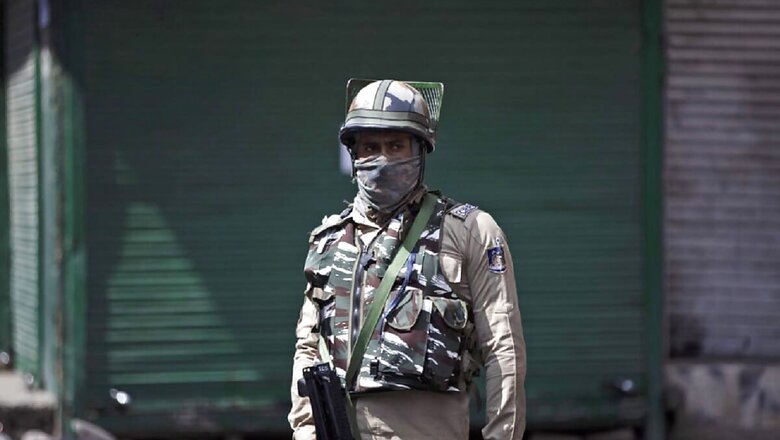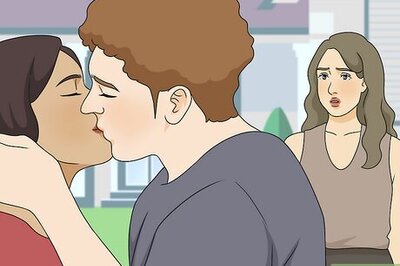
views
I drove around the city of Srinagar on Wednesday: its downtown labyrinth, the lake area, and Lal Chowk's clock tower where I recorded a piece for television on how the Valley was behaving or seemingly forced to behave on the first anniversary of the reading down of Article 370 of the Constitution.
At each bend and square that I crossed, police and paramilitary men with automatic rifles and shotguns stood impassively behind loops of razor wire and smart plastic barricades. They are effecting a strict lockdown within a Covid lockdown that follows the restrictions that kicked off on August 5 last year and persisted for months. The government responding to "inputs of mischief-makers trying to subvert peace", imposed a curfew in Srinagar on Monday but, curiously, lifted it on Wednesday.
Meanwhile, a posse of parachuted journalists out to portray normalcy and happy acceptance of the removal of Kashmir's special status have been making the rounds, looking for 'juicy' footage and soundbites.
The otherwise beautiful city of Srinagar has mostly remained locked and its population anxious since last August when the Indian Parliament in an unexpected and unilateral move struck down Article 370 that gave Jammu and Kashmir some symbolic degree of autonomy.
Union home minister Amit Shah had then told Parliament that the contentious Article blocked the progress and prosperity of J&K. He held militancy, separatism, corruption and dynastic politics of Kashmir responsible for plunging the state into an economic crisis. The government at the Centre promised to build a new or 'Naya Kashmir' where the youth would lap up jobs, education and healthcare would improve, and tourism and industry thrive.
In fact, weeks before Shah's historic speech, the Valley was anticipating some major action. Soldiers from various parts of India were trooped into the Valley for days and fanned across the picturesque hinterland and mofussil towns. Tourists and Amarnath pilgrims on a religious yatra were told to leave instantly. By issuing a series of contingency orders, psy-ops about something 'serious or sinister' were played out in people's minds. Those fears came true on August 5, 2019, when Parliament scrapped the special status and restructured the state into two union territories.
A year on, the concerns have only heightened even as lieutenant governor GC Murmu's administration appears to be in a tearing hurry to push rules that are seen by Kashmiri people and leaders as effectively changing the Muslim-majority character of the erstwhile state by facilitating domicile or new citizenry rights to those who choose to live here. Already four lakh people have been given the domiciles in the past few weeks.
Under the new set of rules, the army and paramilitary forces can now expand their campuses by acquiring land without having to go through cumbersome administrative drills. The rules have been made very facile and action would be taken against officials who delay the process to issue domiciles.
Those keen on settling permanently in Jammu and Kashmir (provided they meet the criteria of living in J&K for more than 15 years or having studied for seven years and passed board examinations of class 10 and 12) can obtain domicile within days of applying.
All these measures and more have fuelled speculation that the 68 per cent Muslim population would gradually face political and administrative disempowerment. The local Kashmiri officers in civil and police administration feel they are being sidelined to insignificant positions. For example, in 20 districts of J&K, only four or five positions of district administrative and police chiefs have been allotted to Kashmiri officers. The ratio is the same or even worse in top bureaucracy or judiciary.
So, a year later, has the watering down of Article 370 been beneficial to the residents of Jammu and Kashmir? The BJP government would like us to believe so but the people in Kashmir and parts of Jammu and Ladakh are livid. Of late, people in the lower Jammu plains and Ladakh district too have been saying they want the Centre's commitment on jobs and land protection, though last year they had celebrated the government's move.
The August 5 step is seen differently by the New Delhi dispensation and Kashmiris. The former sees it as a process of integration of Jammu and Kashmir into the dominion of India and the latter feel they were stripped of their identity and dignity the Article otherwise retained for 70 years.
The Delhi standpoint aside, the anger and frustration in Kashmir is peaking. The huge security bandobast in Kashmir is somehow keeping the restless population in check. Though people have not come out on the roads, they have waged a prolonged and silent protest. But no one knows when the residents will lose patience and the situation explode.
While the people have shown a little interest in the government's promise of ushering in development, on the ground there is scant evidence of any big-ticket project having been completed. In fact, people are living through some of their toughest times in a year-long clampdown that shows no sign of being lifted soon.
The economy of Kashmir is in a shambles. The fabled boathouse and hotel businesses are in the red with no immediate hope of recovery. The tourists have given Kashmir a miss for the fourth straight year. The small-scale manufacturing industry has turned sick and the fruit sector is counting losses. Last fall and early spring, a big fraction of apple boxes could not be shipped out from the Valley. The start-ups set up by young, educated boys and girls folded up. Asma Pandit who ran a software company employing 18 people in Srinagar told me she could not sustain her business in the lockdown and was forced to pack up.
Many employers like her have shut shop and that has resulted in huge job losses. The Kashmir Chamber of Commerce and Industry (KCCI) says 4 lakh jobs were cut in Kashmir and the economy suffered a loss of 40,000 crore rupees over the past year.
That apart, the education of 1.5 million kids is in disarray. The much-publicised online classes have failed to take off in the absence of 4G network. The 2G connections restored a few months ago are painfully slow and kids turn off their devices after losing patience. Remember, they have been to school for only a week or at the most 10 days in the past one year. Before the pandemic shut off schools in Kashmir in March, the August 5 decision last year robbed them of tuition for many months.
The media too isn't finding things easy. The local papers have been rendered toothless by the curbs and shrinking of the advertisement pie. There are no editorials and the ones put up are on everything but politics and the ground situation. The new media policy is restrictive and the repeated harassment of journalists and the recent charges slapped against six of them have not helped matters.
But one of the biggest losses to New Delhi, and this is in the short and long term, is the deliberate bringing down of the political structure: both mainstream and separatists. Though on opposite ideological sides, the unionists and secessionists would form an interface or cushion between the Centre and the restive population of the Valley. As first responders, the unionists would always absorb the shock and anger that was directed at the New Delhi dispensation or its organs, namely the security forces, for instance if any excesses were committed in the Valley. When Afzal Guru was hanged, or much later Burhan Wani killed, the Kashmir regional parties would take blows on behalf of New Delhi. They would calm down raging street anger or criticism coming the Centre's way. The Valley political parties were adept at handling and fixing a looming crisis.
In the late 1990s and the noughties, successive governments at the Centre wittingly or unwittingly used the separatists as safety valves to let out public steam by holding talks with their leaders. The Mirwaiz Umar Farooq-led moderate Hurriyat faction held three rounds of talks with the NDA and UPA governments. On one occasion the Mirwaiz told me he felt more comfortable talking to the Atal Bihari Vajpayee-led government because they understood the Kashmir issue better.
The Delhi-Hurriyat dialogue would often uncork the simmering tensions in the Valley and allow the unionist parties to cover ground, manoeuvre and sell peace, government policies and development to the people. Invariably, this would lead to building an electoral constituency — something the Centre was keen to showcase to the world, that Kashmiris were wholeheartedly participating in Indian democracy.
And now, by aiming to demolish the political structure in Kashmir, the Centre is creating a vacuum which will suck in all kinds of ideologies, most of it from the hardliners who may find it easy to fit into a very fertile ground given the disaffection for the state in the past few years.
It's true that the present regime at the Centre has said more than once that the arrest of Kashmiri leaders did not attract a whimper of protest or shedding of tears, but the loss of this constituency will be a loss for the Centre.
Though the central government is keen to pick and handhold a new leadership, it will take a long time for the entrants to get political sanction from the people. In 1953, when Sheikh Abdullah was jailed and replaced by Bakshi Ghulam Mohammad, Kashmiris did not accord him any legitimacy despite him ruling for 11 years. He and his successors were accused of being foisted by New Delhi and as such were despised by the people. The current leadership that Delhi is trying to prop up may eventually not be acceptable to the people as contemporary history tells us. So either a new leadership needs to come up organically or the old one needs to stand up and represent the aspirations of the people if it has to stay in contention.
As of now, nothing can be said with certainty on whether the old set of Kashmiri leaders will eventually accept the arrangement following the dilution of Article 370 or stay true to the parties' core political ideologies.
Some leaders have already hinted at compromises by making restoration of statehood as a baseline to participate in the electoral politics, though their party's internal dissent has forced them to vacillate between seeking restoration of the special status and statehood. Others have stood their ground. And a not-so-new entrant and former ally of the Prime Minister has seemingly hardened his position.
The unionists who will stick to their guns may be hauled up in jails just like hundreds of those who refuse to fall in line. Former chief minister Mehbooba Mufti's detention was recently extended by another three months for the third time. She and more than a dozen other leaders continue to be under home detention.
Last year's decision has external dimensions as well, and it seems to have got the Dragon all worked up. Many including top commentators of the country link the tense situation with China along the Line of Actual Control (LAC) in Ladakh to the abrogation of J&K's special status and dividing it into two union territories.
According to reports, the Chinese are refusing to back down near parts of the LAC and besides and continue to needle India on other fronts. The development is likely to keep the Indian forces occupied for a considerable period of time, particularly during the very harsh winters in the region.
To get back on its path of development, sooner or later New Delhi needs to untie the knots in Kashmir by holding internal and external dialogue. That will free the Centre to focus its energies on the Covid-19 crisis and rebuild the economy.



















Comments
0 comment